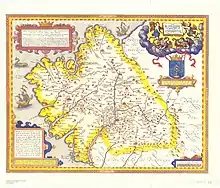Araújo
Araújo or Araujo or Arauxo (Portuguese pronunciation: [ɐɾɐˈuʒu], Spanish: [aɾaˈuxo], Galician pronunciation: [aɾaˈuʃʊ]) is a Galician and Portuguese surname. The surname Araújo is of toponymic origin derived from a place in the Province of Ourense which is part of the Autonomous Community of Galicia in North Western Spain next to the Portuguese border where a Crusader Knight of French Noble descent, Don Rodrigo Anes, was rewarded with reconquered Iberian lands during the Reconquista. Don Rodrigo Anes de Araújo lived in the 14th century during the reign of King Ferdinand I of Portugal (1367-1383). Don Rodrigo Anes de Araújo built a Castle and named it Araújo which can be found in all the ancient Galician maps.
Part of a series on the |
|---|
| History of Galicia |
 |
| Timeline |

Later Pedro Anes de Araújo decided to move from Galicia to live in Portugal and because of this the surname Araújo seems to be a habitational name in Portugal and can be found in and around Portuguese cities such as Coimbra, Elvas, Estremoz, Lisbon, Torre de Moncorvo, Monção, Serpa, Setúbal, and Vila Verde.
A poisonous plant with white fragrant flowers, Araujia sericifera, was named after the botanist António de Araújo e Azevedo, 1st Count of Barca (1754–1817), who was a descendant of Rodrigo Anes de Araújo.
History
The progenitor of this surname Araújo is Rodrigo Anes, who was lord of the lands known as Araúxo located in Southern Kingdom of Galicia in modern NW Spain in the Galician Province of Ourense close to the Miño/Minho river. This river marked the border between Kingdom of Galicia and Northern Portugal, which had been a part of the Kingdom of Galicia in the 12th century.
Rodrigo Anes, better known as Rodrigo Anes de Araújo, was descended from members of the royal families of the kingdom of France and the kingdom of Burgundy via a noble Knight named Jean Tiranoth.
Rodrigo Anes de Araújo constructed the Castle of Araújo in the Kingdom of Galicia and married Doña Mayor Alvares de Aza, who was the daughter of a noble family which was somehow related to Rodrigo Anes de Araújo. Doña Mayor Alvares de Aza was the daughter of Don Rodrigo Alvares de Aza and Doña Maria Pires de Ambia. From this marriage descended the Araújo family of Kingdom of Galicia, who were lords of many houses in that Kingdom through marriage.
The Bishop of Malaca, João Ribeiro Gaio, wrote about the location of the ancient Araújo family cemetery in the following manner:
- Através de Bitorinho
- tem sepulcros já gastados
- Araújos afamados
- na terra que rega o Minho,
- antigos, abalisados.
English Translation
- Across the Bitorinho
- in the land watered by the Miño River
- there are now-worn graves of
- famous Araújos,
- ancient and magnified.
Later, in 1492, the Kingdom of Galicia along with other Kingdoms in the Iberian peninsula were united to become the Kingdom of Spain. Throughout Spain's colonial period between the 16th and 19th century a number of Galician Spaniards bearing the surname Araújo in the service of the King of Spain moved to colonize the territories of the Spanish Empire in North America and South America.
One of the grandchildren of Rodrigo Anes de Araújo known in Portuguese chronicles as Vasco Rodriguez de Araújo, decided to leave Spain and settle in Portugal, where he entered the service of the Kings of Portugal. Throughout Portugal's colonial period a number of Portuguese bearing the Araújo surname moved to settle Portugal's overseas empire.
Notable people with the surname
Church
- Antonio de Araujo (d. 1632), Brazilian Jesuit missionary
- Eugênio de Araújo Sales (born 1920), longest-serving cardinal in the Roman Catholic Church
- Serafim Fernandes de Araújo (born 1924), cardinal archbishop of Belo Horizonte, Brazil
Arts and humanities
- Francisco Correa de Araujo (1584-1654) Spanish renaissance organist, composer, and theorist.
- Cândido José de Araújo Viana (1793-1875), Brazilian writer
- Norberto de Araújo (1889—1952), Portuguese writer, journalist, and geographer of Lisbon
- César Calvo de Araujo (1910-1970), Peruvian writer and painter
- Cristiano Araújo (born 1986-2015), was a Brazilian sertanejo singer and songwriter
- Juan de Araujo (1646-1712), Spanish-Peruvian Musician
- Loipa Araújo (born 1943), Cuban prima ballerina
- Manuel de Araújo Porto-alegre, Baron of Santo Ângelo (1806-1876), Brazilian poet and playwright
- Nelson de Araújo (1926-1993), renowned author
- Taís Araújo (born 1978), Brazilian actress
- Sonia Araujo (born 1970), Portuguese TV presenter
- Kate DeAraugo (born 1985), Australian singer
- Arturo Araujo (born 1967), Colombian Artist
- Heriberto Araújo (born 1983), Spanish journalist and writer
- Mia Araujo (born 1986), Argentine-American painter
Science and technology
- Orestes Araújo (1853-1915), Uruguayan scholar
- Jorge Quina Ribeiro de Araújo (born 1941), Portuguese academic and three times rector of the University of Évora
- Emanuel Araújo (born 1942), history professor
- Miguel Bastos Araújo (born 1969), Portuguese scientist
- Carlos Ernesto Araujo (born 1968), pulmonologist
Politicians
- Aliança de Araújo (born c. 1951), East Timorese politician
- Álvaro Araújo Castro (born 1967), Colombian politician
- Arturo Araujo, president of El Salvador
- Consuelo Araújo (1940-2001), Colombian politician, writer and self-taught journalist
- Fernando Araújo Perdomo (born circa 1955), Minister of Development of Colombia
- Fernando de Araújo (born 1962), East Timorese politician
- Hernando Molina Araújo (born 1961), Colombian politician
- João Augusto de Araújo Castro, Brazilian diplomat and minister
- João Batista Oliveira de Araujo, Brazilian politician
- Luís Araújo (born 1949), Chief of Staff of the Portuguese Air Force
- Manuel Enrique Araujo (1865-1913), President of El Salvador
- María Consuelo Araújo (born 1971), Colombian politician
- Mariano de Araújo Matsinhe (born 1953), Mozambican politician
- Nelson Araujo (born 1987), American politician
- Theolinda Olympio de Araújo, Brazilian politician
- José Sarney de Araújo Costa, Brazilian President
- Joaquim Aurélio Barreto Nabuco de Araújo (August 19, 1849 – January 17, 1910) was a Brazilian writer, statesman
- Pedro de Araújo Lima, Marquis of Olinda (22 December 1793 – 7 June 1870), politician and monarchist of the Empire of Brazil
- Manuel de Araújo, Mozambican politician
Sportspeople
- Araujo (footballer) (born 1998), Brazilian football player, full name Araujo de Oliveira Henrique
- Napoleon Araújo Doffigny (born 1929), South American pole-vaulting champion, Bolivian national fencing, track and football champion
- George Araujo (1931 - 1997), American boxer
- Eronilde de Araújo (born 1970), Brazilian athlete
- Marcelo Araujo, Argentine sports journalist
- Márcio Araújo (born 1973), beach volleyball player
- Mário de Araújo Cabral (born 1934), former racing driver
- Rafael Paulo de Lara Araújo (born 1980), Brazilian professional basketball player
- Armindo Araujo (born 1977), Portuguese rally driver
- Pedro Araújo (born 1993), Dominican professional baseball pitcher
Footballers
- Alcides Araújo Alves (born 1985), Brazilian footballer
- Carlos Luciano Araujo (born 1981), Argentinian defender
- Clemerson de Araújo Soares (born 1977), Brazilian footballer
- Denílson de Oliveira Araújo (born 1977), football winger
- Gustavo Lazzaretti de Araújo (born 1984), Brazilian central defender
- Ilan Araujo Dall'Igna (born 1980), Brazilian football forward
- José Carlos da Costa Araújo (born 1962), Brazilian football goalkeeper
- Joubert Araújo Martins (born 1975), Brazilian association football player
- Leonardo Araújo (born 1969), football midfielder
- Márcio Rodrigues Araújo (born 1984), Brazilian defensive midfielder
- Marcos Gomes de Araujo (born 1976), Brazilian striker
- Néstor Araujo (born 1991), Mexican footballer
- Oélilton Araújo dos Santos (born 1981), Brazilian-born Croatian footballer
- Patricio Araujo (born 1988), Mexican footballer
- Paulo Araujo Jr. (born 1989), Brazilian striker
- Raffael Caetano de Araújo (born 1985), footballer
- Reginaldo Araújo (born 1977), Brazilian defender
- Ricardo Martins de Araújo (born 1986), Brazilian footballer
- Ronny Heberson Furtado de Araújo (born 1986), Brazilian football defender
- Saulo Araújo Fontes (born 1989), Brazilian goalkeeper
- Sérgio Araújo (born 1963), Brazilian winger
- Sergio Araujo (born 1992), Argentine striker
- Telmario de Araújo Sacramento (born 1983), Brazilian striker
- Thiago Luiz Moreira de Araújo (born 1988), Brazilian full back
- Vinícius Vasconcelos Araújo (born 1993), Brazilian striker